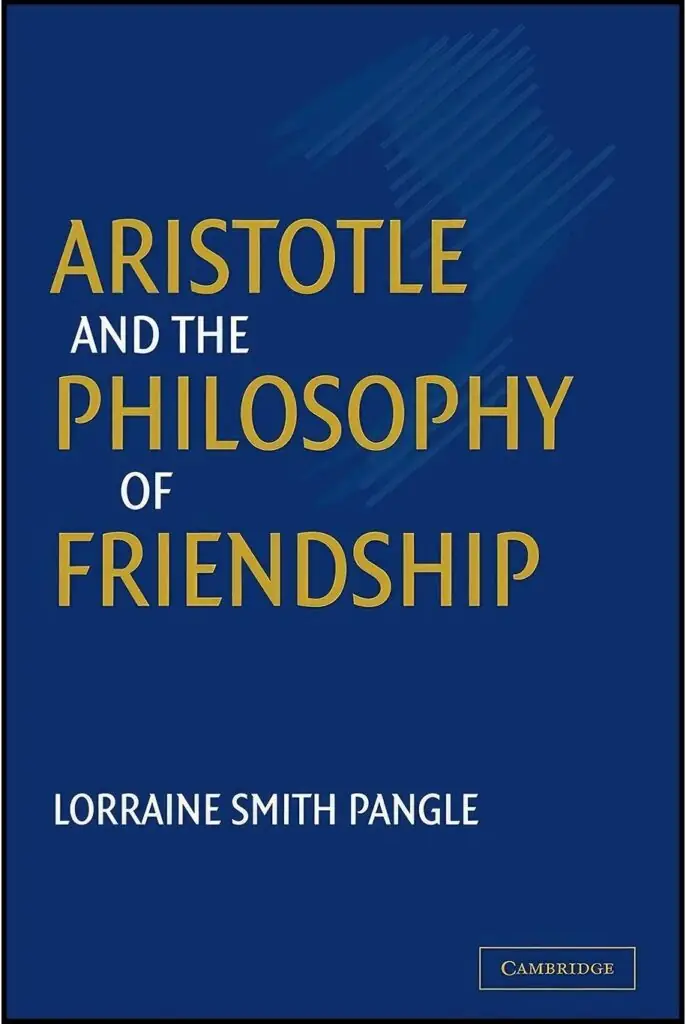Friendship is a fundamental way people connect, offering support and a sense of belonging. Given its profound significance, it has been a subject of interest for many great philosophers, including Aristotle. Aristotle believed that true friendship is only possible between two “good” people who share similar virtues and can love each other for who they truly are. But there’s much more to his philosophy on relationships.

✅ AI Essay Writer ✅ AI Detector ✅ Plagchecker ✅ Paraphraser
✅ Summarizer ✅ Citation Generator
What Is Friendship and What Does It Take to Be a Good Friend?
Aristotle, the ancient Greek philosopher, had a profound understanding of friendship, which he saw as essential for living a good life. He argued that friends are important for both celebrating good times and providing support during bad times.
Aristotle’s take on friendship is pretty fascinating. In his book, Nicomachean Ethics, he breaks down friendships into three types: utility, pleasure, and virtue. Utility friendships are those where both people get something useful out of it, like study partners. Pleasure friendships are based on having a good time together, like a friend who always makes you laugh. These types are fine, but they’re usually short-lived because they’re based on temporary benefits.

The gold standard for Aristotle is the friendship of virtue. This type of friendship happens between people who are “good” and share similar virtues. They love each other for who they are, not for what they can get from each other. These friendships are rare and take time to build because they require a deep connection and mutual respect.
True friends, according to Aristotle, help each other become better people. They support each other’s goals and encourage each other to live a virtuous life. This kind of friendship is a big part of achieving eudaimonia, which means human flourishing or living your best life. So, as Aristotle sees it, being a good friend means being virtuous, genuinely caring for your friend’s well-being, and supporting them in their journey toward a good life.
Three Lessons of Friendship
If we look closer into Aristotle’s teachings, we will also be able to find a couple of lessons there that could be used both to understand friendship as a concept and to build this type of connection with other people.
1. Friendship Is Reciprocal and Recognized
Aristotle emphasized that true friendship is a two-way street. It requires mutual goodwill and recognition. Imagine trying to be friends with a celebrity—no matter how much you admire them, if they don’t know you exist, it’s not a real friendship. The fact that the friendship should be mutual is fundamental. Both parties need to care for and acknowledge each other for a genuine friendship to flourish.
2. Different Types of Friendships
As we mentioned before, the philosopher identified three types of friendships: utility, pleasure, and virtue. Utility friendships are based on mutual benefits and pleasure friendships are about enjoying each other’s company, like friends who hang out for fun. The highest form, virtue friendship, is based on mutual respect and admiration for each other’s character. While virtue friendships are the most fulfilling, they’re also the rarest because they take time and effort to develop and maintain. Each type of friendship has its place and value, as long as both parties understand and agree on the nature of their relationship.
3. Friendship Requires Maintenance

Just like staying fit requires regular exercise, maintaining a friendship requires ongoing effort and activities. Aristotle pointed out that friends need to do things together to keep their bond strong. While modern technology allows us to stay connected across distances, the quality of our friendships can decline if we don’t actively engage with our friends. This was evident during the COVID-19 pandemic when many people saw a drop in the quality of their friendships due to reduced interaction.
The Critique of Aristotle’s View on Friendship
While Aristotle’s ideas on friendship are highly influential, they are not absolute. Many philosophers have reviewed his works and views and as a result, have posed rather important questions and found holes in his theory.
The most prominent critic of Aristotle’s take is Lorraine Smith Pangle. In her study of Aristotle’s Nicomachean Ethics, she argues that Aristotle’s view of virtue being most perfectly realized in friendship is somewhat flawed. Pangle believes Aristotle’s emphasis on moral virtue within friendships overlooks the complexities and inherent self-interest that can exist even in virtuous friendships. She points out that Aristotle’s idea of friends loving each other for their own sake is ambiguous, suggesting a confusing mix of self-interest and genuine appreciation.
The philosopher also highlights that Aristotle’s classification of friendships into utility, pleasure, and virtue can be too simplistic. She argues that these categories don’t fully capture the nuances of human relationships, especially in today’s context where social dynamics are far more complex. Critics also question Aristotle’s notion that only “good” people can form true friendships, as this seems to exclude the possibility of deep, meaningful connections among those who may not be virtuous by his standards.
Additionally, Pangle suggests that Aristotle’s portrayal of the philosophical life as the ultimate form of happiness undervalues the significance and role of public and political spheres in human life. Following this belief, Aristotle’s ultimate emphasis on philosophical contemplation over other forms of happiness can present a rather limited view of human fulfillment. This suggests that friendships based on philosophical discussions are superior to all others. Pangle argues that such a view undermines the value of more common forms of friendship that can also lead to personal growth and happiness.
Looking at the critique it is hard to argue that it makes sense. Hence, while we can agree that Aristotle’s views on friendship are foundational, they may not fully represent the diverse nature of human relationships.
The Main Point
Aristotle’s concept of virtuous friendship offers a high standard to aspire to, but it also challenges us to question how we form and maintain relationships in our own lives. Are our friendships built on mutual respect and shared values, or are they more fleeting, based on convenience and pleasure? Take a moment to think about the friends who truly matter to you and consider what makes those relationships special. This introspection might just reveal new ways to nurture and deepen those bonds you already have, leading to a more fulfilling and connected life.
FAQ
Follow us on Reddit for more insights and updates.







Comments (0)
Welcome to A*Help comments!
We’re all about debate and discussion at A*Help.
We value the diverse opinions of users, so you may find points of view that you don’t agree with. And that’s cool. However, there are certain things we’re not OK with: attempts to manipulate our data in any way, for example, or the posting of discriminative, offensive, hateful, or disparaging material.